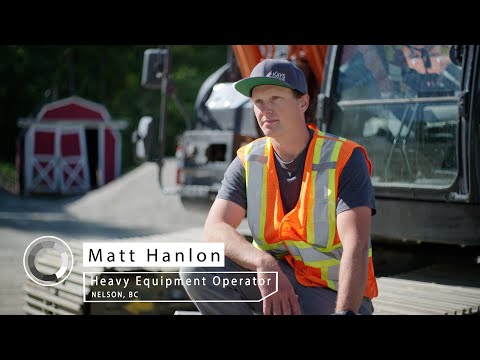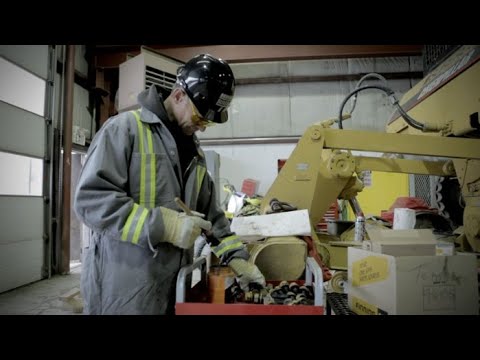Career Overview
Heavy equipment operators run heavy equipment used to build or maintain:
- Roads
- Bridges
- Airports
- Gas and oil pipelines
- Tunnels
- Residential housing and other buildings
- Utilities (water, sewer, storm water management)
They also operate heavy equipment used in mining, quarrying and material handling.
People in this career work for:
- Public works departments/municipalities
- Heavy equipment contractors
- Construction, pipeline, logging, cargo-handling, demolition, marine and environmental restoration operations
Job Titles
Duties
In general, heavy equipment operators:
- Operate heavy equipment – excavators, backhoes, bulldozers, loaders, haul trucks, skid steers, telehandlers, rollers, side booms and graders
- Excavate, move, load and grade earth, rock, gravel and other materials
- Use heavy equipment to clear brush and stumps for roads or new construction
- Use heavy equipment for pile driving to support construction of buildings, bridges or other structures
- Operate heavy dredging equipment to deepen waterways
- Operate power shovels to excavate rock, ore or other materials from open-pit mines, strip mines, quarries or construction pits
- Clean, lubricate and refill equipment
- Perform daily maintenance and inspections
Earnings
Earnings is income that workers receive in exchange for their labour. Depending on the type of employment, earnings can be in the form of wages (hourly), salaries (fixed monthly or annual) or self-employed earnings.
Work Environment
# Workers Employed
12,095% Employed Full Time
52%Working with heavy equipment can be dangerous. Work often takes place in hazardous locations such as construction and underground sites. Workers may be exposed to all types of weather conditions, steep and uneven terrain, dust, noise and vibration.
Heavy equipment operators may be required to work overtime as needed. Work may take place in remote camps and other out-of-town locations.
Career Pathways
Progression to supervisory positions such as foreperson, superintendent and owner/operator is possible with experience.
Occupational Interests
It’s important to understand what kinds of occupations align with your interests.
For more about occupational interests visit Skills for the Future Workforce > Characteristics.
Here are the top occupational interest(s) for this career profile:
Education, Training and Skills
Heavy equipment operators must:
- Have some secondary school education
- Complete a one- to two-year apprenticeship program or high school, college or industry courses in heavy equipment operation
- Have on-the-job training
Some employers may require internal company certification or an apprenticeship certificate of qualification.
For heavy equipment operators coming to B.C. from another province, having a Red Seal endorsement may help workers get jobs. Red Seal endorsement is not currently offered for certification in B.C; heavy equipment operators certifying in this province are granted a B.C. Certificate of Qualification.
Education programs in B.C.

Top Skills
Every job calls for a certain set of skills. Knowing those skills is the first step in finding a good career fit.
Here, you will find the 10 most relevant workplace skills. Some are more important to achieving success in a certain career than others. These skills may come naturally to you or you may need to gain them through education, training and experience.
See the list of work-related skills below, ranked in order of importance for this career. Check out the list and see if this career matches your skills—take that first step!
Controlling operations of equipment or systems.
Watching gauges, dials or other indicators to make sure that a machine is working properly.
Keeping track of and assessing your performance, other individuals, or organizations to make improvements or take corrective action.
Determining causes of operating errors and deciding what to do about it.
Adjusting actions in relation to others' actions.
Performing routine maintenance on equipment and determining when and what kind of maintenance is needed.
Using logic and reasoning to identify the strengths and weaknesses of alternative solutions, conclusions or approaches to problems.
Giving full attention to what other people are saying, taking time to understand the points being made, asking questions as appropriate, and not interrupting at inappropriate times.
Considering the relative costs and benefits of potential actions to choose the most appropriate one.
Talking to others to share information effectively.
Labour Market Statistics
Discover data, facts and information that have been gathered and analyzed. Learn about the characteristics of the economy and labour market in B.C.
Employment
Find out about employment types and trends by region and industry.
Employment
12,095Employment by Region







| Region | Employment | % Employment of this Occupation |
|---|---|---|
| Cariboo | 950 | 7.9% |
| Kootenay | 1,485 | 12.3% |
| Mainland/Southwest | 3,935 | 32.5% |
| North Coast and Nechako | 775 | 6.4% |
| Northeast | 665 | 5.5% |
| Thompson-Okanagan | 2,415 | 20.0% |
| Vancouver Island/Coast | 1,870 | 15.5% |
Labour Market Outlook
The B.C. Labour Market Outlook is a 10-year forecast of the expected supply and demand for labour in the province. It’s usually updated every year. The purpose is to provide British Columbians with the knowledge to make informed decisions on careers, skills training, education and hiring.
Forecasted Job Openings (2025-2035)
4,490Forecasted Job Openings
Forecasted Employment Growth Rate
Composition of Job Openings
Job Openings by Region (2025-2035)







| Region | Job Openings | Avg. Annual Employment Growth |
|---|---|---|
| Cariboo | 240 | -0.1% |
| Kootenay | 670 | 0.1% |
| Mainland/Southwest | 1,420 | 1.1% |
| North Coast and Nechako | 250 | -0.1% |
| Northeast | 250 | 0.6% |
| Thompson-Okanagan | 960 | 0.7% |
| Vancouver Island/Coast | 700 | 0.7% |
Industry Highlights
Learn about the opportunities in B.C.'s major industries, including employment trends, earning potential, locations of work and more.
Forecasted Job Openings by Industry
| Industry | Job Openings (2025-2035) |
|---|---|
| Construction | 2,050 |
| Mining and Oil and Gas Extraction | 1,420 |
| Transportation and Warehousing | 340 |
| Manufacturing | 120 |
| Business, Building and Other Support Services | 110 |
Insights from Industry
Heavy equipment operation is an industry where supply and demand ebb and flow. When there are major projects happening across the province there is a correspondingly high demand for heavy equipment operators; at other times, there may be a surplus of workers.
Resources
-
BC Building Tradeswww.bcbuildingtrades.org
-
B.C. Road Builders & Heavy Construction Associationwww.roadbuilders.bc.ca
-
British Columbia Construction Association (BCCA)www.bccassn.com
-
BuildForce Canada – Career Finderwww.buildforce.ca/en/career-finder/
-
Independent Contractors and Businesses Association (ICBA)www.icba.ca
-
IUOE Local 115 (Operating Engineers)www.iuoe115.ca
-
Mining Association of British Columbia (MABC)www.mining.bc.ca
-
Piledrivers, Divers, Bridge, Dock and Wharf Builders Union Local 2404www.piledrivers2404.ca
-
SkilledTradesBC – Heavy Equipment Operatorskilledtradesbc.ca/heavy-equipment-operator
-
Skilled Trades Employment Program (STEP)www.stepbc.ca









